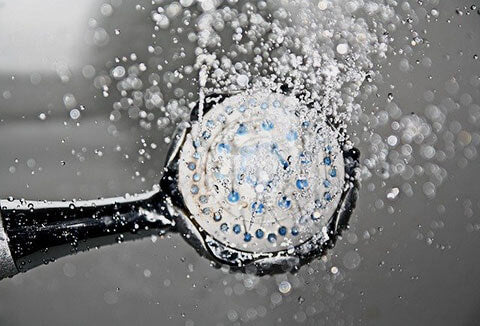Most rain shower systems are today more advanced and consist of high-tech shower panels, multi-functional showerheads, as well as shower faucets made from durable materials. These rain shower systems can be quite expensive to purchase, install as well as replace. Therefore, to avoid damaging them, it would help to practice particular habits to make sure your shower fixtures stay in good condition for an extended period.
-
Avoid using hard water
Hard water is water that contains high levels of minerals such as calcium. Even though such water doesn’t pose any health risks, a build-up in such minerals will affect shower fixtures, bathroom pipes, and other shower appliances by reducing their durability.
The best solution for this issue is to install water filters. Water filters trap contaminants such as pesticides and mineral deposits and also soften hard water. Installing water filters in the shower is only necessary if you don’t have one for the whole house.
There are various types of filters in the market, and each has a specific purpose.
- Carbon filters are best for removing chlorine from your water due to their high capacity to absorb it. One thing to note is that they are only useful for people who turn their water levels at moderate heat
- KDF filters also remove chlorine, just like carbon filters. Additionally, these filters remove metals such as lead and hydrogen sulfide and reduce the odor coming from your shower water. They are however much more expensive than carbon filters
- Vitamin C filters are the least effective; however, they do reduce some trace amounts of chlorine. They are also the most expensive ones. Therefore, it would be wise to go for the other types
Some of the best water filter brands include the Sonaki carbon filter, QwenchPure KDF filter as well as the Aquasana AQ-4100 carbon filter.

-
Clean your rain shower system regularly
Cleaning your shower is a much simpler process than it may seem. You only need to use household items that are quite affordable and accessible. Avoid using harsh chemicals, abrasives, and bleach as they might damage the finishing on your shower fixtures and panels.
Cleaning your showerhead
Two types of rain showerhead exist, i.e., fixed and detachable. When it comes to cleaning, the significant difference is that you’ll clean the fixed one without moving it while you can soak and disassemble the detachable showerhead.
You will need a soft sponge and microfiber towel, ziplock bag, rubber band, white vinegar, baking soda, a soft toothbrush, and a toothpick. Mix equal parts of water and vinegar then add baking soda in the ziplock bag. Soak the showerhead in the solution by tying the rubber band over the ziplock and leave it overnight.
Rinse the inlets on the surface of the showerhead. Use a toothbrush or toothpick to remove all the build-up. Turn on your water to rinse all the vinegar and dirt out.
Cleaning your valve cartridge
You will need first to remove the shower cartridge from the valve then soak it in a vinegar solution for about an hour. Rinse the valve opening by turn on the water so that it gets out through the open valve. Rinse the cartridge then reassemble it firmly on to the valve.
Cleaning the surfaces on your faucets
Never let the water evaporate on its own. Use a damp cloth to wipe off the water spots. If you happen to be using hard water or your water filter isn’t working, wipe the surface using a vinegar solution.
-
Buy high-quality showerheads
Another way to ensure your shower system lasts is by buying high-quality showerheads and panels. Always check whether the showerhead has a steady water flow and covers a wide area. The shower panel should have various alterable settings, which should be energy and water saving as well.
Some of the standard high-quality shower systems include the HOMELODY Bronze rain shower and the KOJOX rain shower.
-
Ensure that all leaks are repaired immediately
It would be best if you never ignored any shower leaks, no matter how minor they may seem. A faucet leak is first of all inconveniencing, as you may require to put a bucket beneath to collect the water. Also, the leak will likely increase your water costs.
Leaks create a damp environment that allows mould to grow. Mould ruins the drywall as well as shower tiles, so you will have to replace them.
Sometimes the leak may not be apparent. Therefore, the best way to check for leaks would be looking for cracks, discoloration as well as stains on the bathroom walls. Another sign of water leak is when some shower surfaces feel soft.
You may want to install shower valves that have stops. These are “shut-off” apparatuses that allow you to isolate the water line in the shower. You can use these stops to reduce water wastage. Also, they are quite useful during shower system maintenance as they allow you only to shut off the water directed towards the shower instead of the mainline that supplies water to your kitchen, toilets, and other areas.
Finally, to make the fixtures and shower appliances last longer, it’s advisable to use soft water, install the right parts, clean the entire bathroom regularly as well as repair any damage immediately. Following these tips is a sure-fire way to make your shower system last for a long time.




